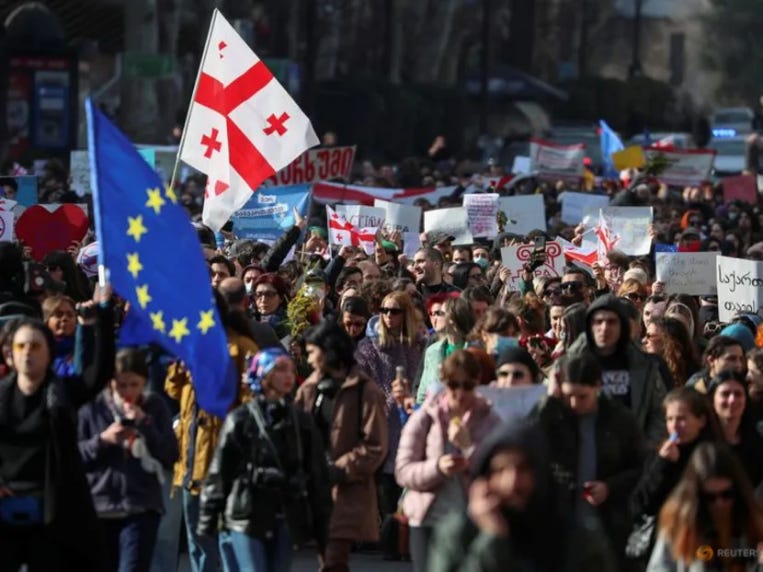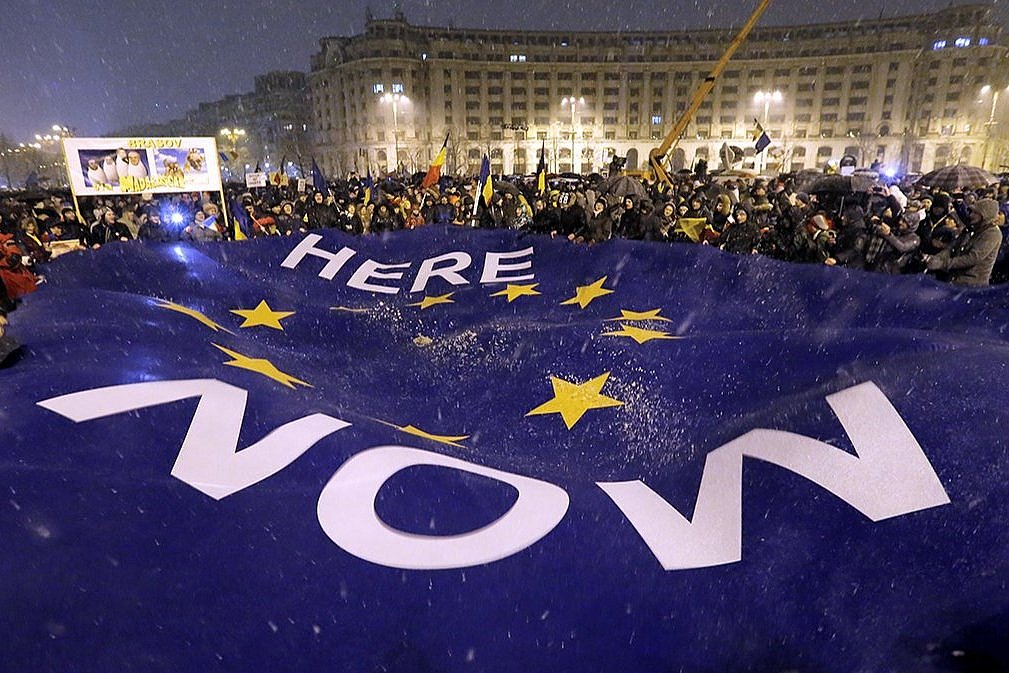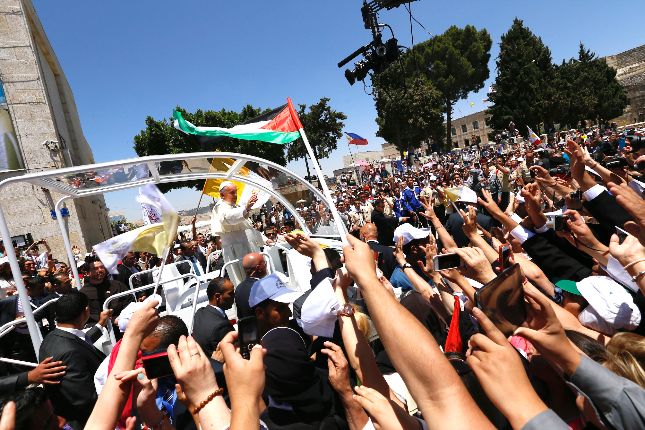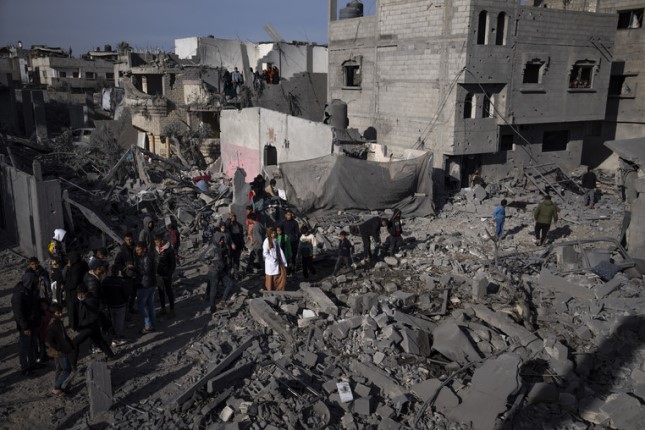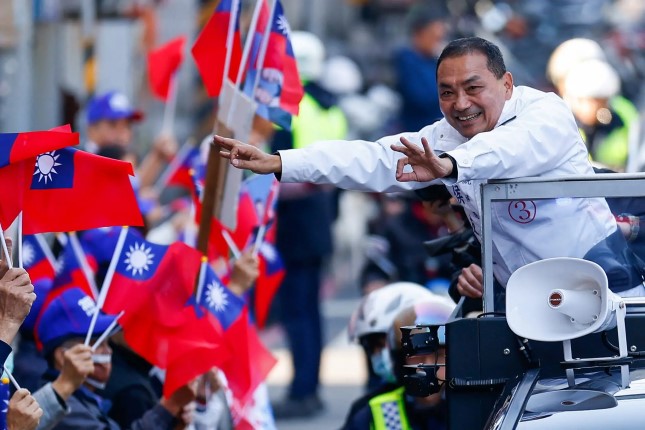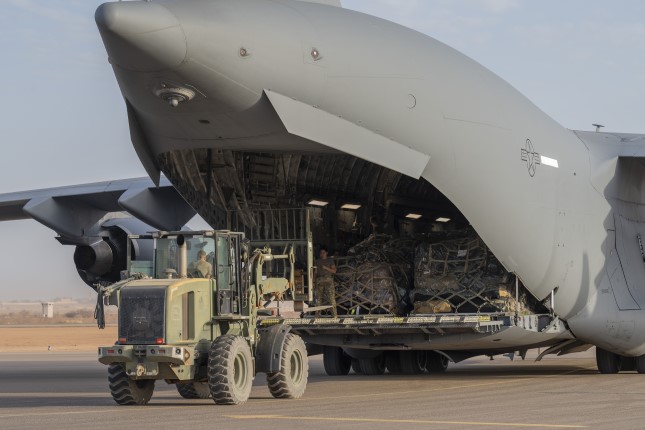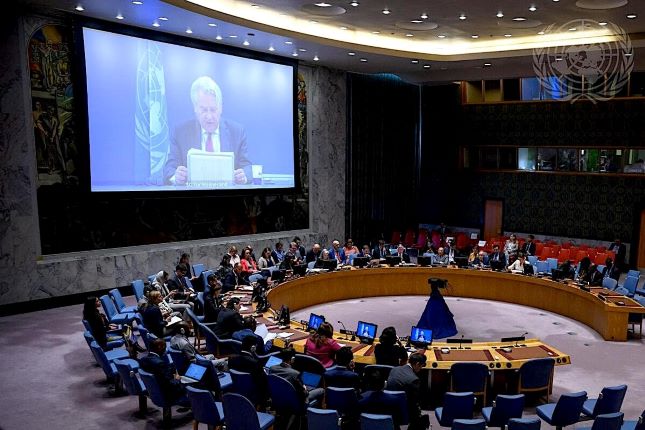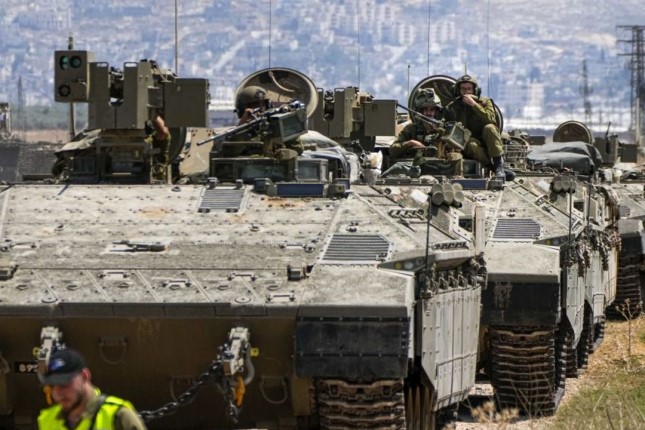“Sokhumi!” Sokhumi!” Sokhumi!”
The shouts ring out from the assembled crowds of Georgian youth in Rustaveli Plaza, in front of the parliament building in the Georgian capital of Tbilisi. Sukhumi (Sokhumi is the Georgian pronunciation) is the capital of Abkhazia, the breakaway Georgian territory which separated after a year-long war that left thousands of dead on each side, and hundreds of thousands of Georgians without a home.
“Sokhumi!” “Sokhumi!” “Sokhumi!”
Those words resonated with me more than most Americans. My wife was born and raised in Sukhumi, and I travelled to Sukhumi in the summer of 1991 in a successful bid to convince her to marry me.
Sukhumi was where my wife’s parents met, married, and made a life together, raising a family while pursuing a career teaching at the local university.
Sukhumi was where my wife’s father, Bidzina, along with the other male faculty from the Sukhumi Institute of Subtropical Agronomy, was drafted into the Georgian military at the age of 62, serving in a unit tasked with guarding a strategic bridge heading south out of the city. He and his fellow draftees defended the bridge through artillery attacks that deafened him, and aerial bombardment that eventually wounded him in the back.
Despite his wounds, Bidzina helped his fellow academics defend the bridge to the last, holding it open for the last wave of refugees to escape the murderous wrath of the Abkhazian rebels who captured the city from the Georgian defenders in late September 1993. Only after he ran out of ammunition did Bidzina retreat from his post, joining the long line of human detritus in their long road of flight over the mountains, to safety.
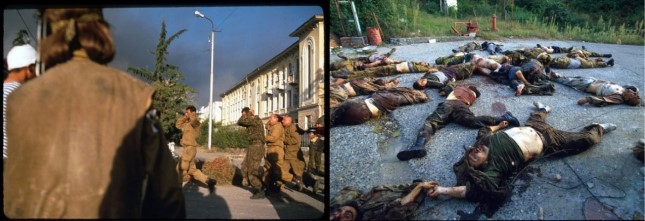
Georgian forces surrendering to the Abkhaz on September 27, 1993, and their bodies after being executed later that same day.
My wife’s family’s home was taken over by the victorious Abkhaz, along with those of hundreds of thousands of others who were either killed, or else fled for their lives.
Bidzina rarely talked about his wartime experience. Once I was able to get him to relate what had happened during the retreat from Sukhumi. He told me of how many of the women and children had been forced to flee for their lives in their night clothes, and how they perished in the freshly fallen snow that covered the mountains they had sought refuge in.
Bidzina spoke of coming across the bodies of frozen mothers hugging their children in a desperate attempt to pass life-saving warmth to their now lifeless bodies, of carrying newly orphaned infants in his arms, only to come across more—too many for one man to carry. The pain in his eyes as he left the rest of the sentence unspoken—that to save some, he had to leave others to their fate—was haunting then, and haunts me in my memories today.
There was a reason he hugged his granddaughters so close…
“Sokhumi!” “Sokhumi!” “Sokhumi!”
More than those who chanted those words, I knew the pain caused by the loss of that city, and Abkhazia as a whole. For decades, I watched as my wife’s family suffered with the knowledge that all they had worked for in life had been abandoned to an enemy who had no intention of allowing them to return. Bidzina and his wife, Lamara, both died thousands of miles away from their homeland, condemned to be buried under the foreign soil of a country they were grateful to for taking them in, but which was, and could never be, their homeland.
“Sokhumi!” “Sokhumi!” “Sokhumi!”
As I watched these angry young Georgians demand that their government act to return “unconquered” Georgia to its control, I knew something wasn’t right with the scene unfolding before me. There was an ingredient missing from the soup of emotions on display, and that ingredient was my country—the United States of America.
The demonstration that brought these angry young Georgians before the parliament building did not originate as a call to action regarding the liberation of Sukhumi, but rather to protest a proposed law which would have required media and nongovernmental organizations that receive more than 20% of their funding from foreign sources to register as agents of foreign influence. The law was modeled on the US Foreign Agents Registration Act (FARA) of 1938, which requires people to disclose when they lobby in the US on behalf of foreign governments or political entities.
Critics of the law declared that, if passed, the legislation—which they derided as a pro-Russian law, could hinder Georgia’s goals of joining NATO and the European Union, noting that the foreign agents bill was similar in intent to one enacted in Russia in 2012 that paved the way for the Russian government to close down numerous non-governmental organizations (NGOs) accused of supporting the work of opposition politicians.
In many ways, the critics were correct—the practical outcome of the foreign agents bill would have been to expose the extent to which Georgian politics and governance had become overrun with foreign money and influence. The threat, however, didn’t come from Russia, but rather the United States, which uses the $40 million in aid funneled through the United States Agency for International Development (USAID) every year to conduct what amounts to a “soft coup” in Georgia designed to displace the current government with one that will be compliant to American—not Georgian—goals and objectives—including the establishment of a “second front” against Russia.
All of this is done, according to Samantha Power, the Director of USID, to build “a country with free expression, a free press, & a path to Euro-Atlantic integration.”
But what she really means is a country that suppresses any dissent as “disinformation,” uses the media as state-sponsored propaganda, and removes from power any politician or political party that dares impede Georgia’s absorption into the US-led NATO sphere of influence.
Georgia’s Prime Minister, Irakli Garibashvili, does not want an expanded war with Russia—especially one that drags Georgia into the conflict.
As such, Samantha Power and her minions at USAID believe the prime minister of Georgia must now be removed and replaced with an anti-Russian (i.e., pro-war) leader cut from the same pro-American cloth as Georgia’s US-backed President, Salome Zurabishvili.
To accomplish this, USAID funds programs designed to foment a “bottom-up” transformation of Georgian society and politics by empowering “diversity” at the grass-roots level, suppressing opposing points of view in the name of building “societal resilience to disinformation,” and seizing control of the electoral process so that the US-controlled “diversity” movements can prevail in local elections and, by extension, national elections.
The Georgian foreign agents bill would have exposed the level to which these USAID-funded programs, and other related US and EU-funded activities, had infiltrated Georgian society. For that reason, the US mobilized its paid activists to take to the streets, forcing the Georgian Prime Minster to pull the plug on the legislation in the interests of public safety.
Former Supreme Court Justice Louis Brandeis once famously observed that “Sunlight is said to be the best of disinfectants,” implying by extension that democracy thrives in an atmosphere of total transparency.
The fact that Samantha Power and USAID do not want any sunlight shone on the extent to which their activities have corrupted Georgian sovereignty is proof positive of the extent to which the disease of American-funded “soft power” has infected the Georgian nation.
One would think that the Georgian people had built up antibodies to the American infection, having suffered through a short but violent war with Russia in August 2008 brought on by American exhortations to militarily confront Russia as a prerequisite for joining NATO. This message was passed to former Georgian President Mikhail Saakashvili by then-US Secretary of State Condoleezza Rice during her July 9, 2008 trip to Georgia. The stated goal of the visit was to discuss the prospects of Georgia joining NATO, during which time the senior US diplomat publicly declared America’s support upholding Georgia’s “territorial integrity.”
Up until Secretary Rice’s July 2008 visit, Saakashvili had regular meetings with Russian President Dmitry Medvedev, where they discussed the possibilities for a negotiated solution to the problem of returning the breakaway territories of Abkhazia and South Ossetia to Georgian sovereign control. In the immediate aftermath of his meeting with Rice, Saakashvili terminated all communications with Medvedev.
The extent to which Condoleezza Rice encouraged Saakashvili to provoke a military conflict with Russia is a matter of dispute. The US State Department contends that Rice cautioned Saakashvili from taking any precipitous actions against the Russians, while the former Georgian President insists Rice had given him the green light to take action.
Regardless, when Saakashvili sent the Georgian army rolling into South Ossetia on the morning of August 7, the US was not willing to back up the alleged exhortations of Condoleezza Rice with military force. While some participants in the emergency meeting in the White House Situation Room that was convened in the aftermath of the Georgian incursion, and Russian response, urged the US military to carry out operations in support of the Georgian military, such as bombing the Roki tunnels that connected South Ossetia with North Ossetia, and through which the Russians were sending troops and supplies to support their counterattack, then-US National Security Advisor Steve Hadley silenced the room by asking the simple question, “Are we prepared to go to war with Russia over Georgia?”
The answer was a resounding “No.”
For Georgia, this was a bitter pill to swallow. Afterall, Georgians had paid a blood price for American loyalty, sacrificing 35 killed and 300 wounded while supporting America’s post-9/11 wars in Iraq and Afghanistan.
To this now must be added 180 dead soldiers, and another 1,174 more wounded, in Georgia’s short five-day defeat at the hands of the Russian military, who quickly pushed the Georgians out of South Ossetia, before pushing into Georgia proper, halting just outside the capital of Tbilisi.
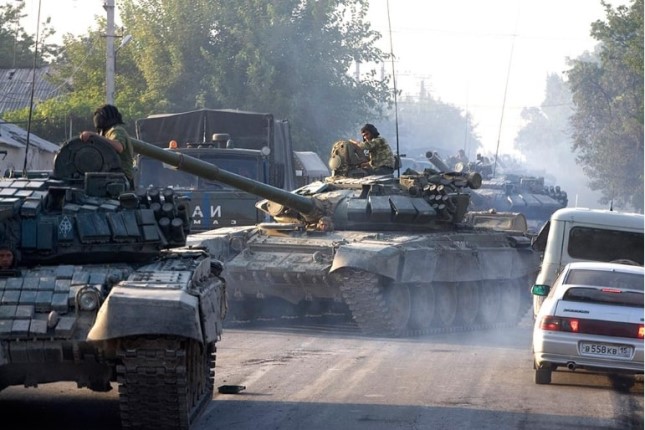
Russian tanks on the road to Tbilisi, August 2008.
America is fully prepared to let Georgians die for our causes, whether on the soil of far way lands that pose no threat to Georgia, or on Georgian soil in pursuit of American geopolitical ambition.
But we will never sacrifice a single American life in defense of Georgia.
You see, in the minds of American officials like Samantha Power and Condoleezza Rice, Georgia exists only to do the bidding of its American master.
The Georgian youth shouting “Sokhumi!” “Sokhumi!” Sokhumi!” into the evening air in Tbilisi’s Rustaveli Plaza labor under the misguided notion that there exists some sort of fraternal bond between them and the American people.
They couldn’t be more wrong.
To the extent Americans know anything about Georgia and Georgian culture, this “knowledge” is limited to a superficial appreciation of Georgian cuisine and dance that can be encapsulated into what I call the “five K’s”—Khinkali, Khachapouri, Khvanchkara, Kartuli, and Khoroumi.
Khinkali, or Georgian dumplings, are a mainstay in Russian and/or Georgian restaurants, a popular appetizer made of twisted dough stuffed with minced meat (traditionally lamb, but also beef and pork mixed), onions, chili pepper, salt, and cumin which, because the meat is uncooked when placed in the dough, produces a savory broth when boiled. Connoisseurs of Khinkali know to suck the broth from the dough ball, lest it explode when cut into, and to leave the thick twisted knot on their plate as evidence of their conquest (because you can’t eat just one).

Khinkali (left) and Adjarian Khachapouri (right).
Khachapouri is the delicious Georgian cheese bread which has various variations, depending upon where in Georgia it is being made. Adjarian Khachapouri, consisting of a thick boat-shaped bread loaf containing cheese topped by an egg, is very popular. My wife’s family is more particular to Imeruli Khachapouri, where a thin layer of cheese is placed between two thin layers of dough to produce a pizza-like crust filled with a buttery-cheese center that bursts with flavor when consumed. There are, as one can imagine, various variations of these theme.
And what better to wash down a fine Georgian meal of Khinkali and Khachapouri than a bottle of Khvanchkara, a Georgian semi-sweet red wine. Named after the village where the winery is established, Khvanchkara wine dates to a process perfected in the 1880’s by Dmitri Kipiani, a member of the Georgian nobility, who in 1907 entered his wine, at that time called “The Kipiani Wine,” in the European Wine Festival, where it took home the Gold Grand Prize. In 1927 the Kipiani winery was taken over by new management (it was, after all Soviet times, when nobility were openly frowned upon—or worse). Renamed “Khvanchkara, Ltd,” the new winery continued the tradition of Kipiani, producing a wine which was identical to that of its predecessor in every way except the name.
The Kipiani Wine had caught the attention of a young Seminarian-turned revolutionary named Ioseb Dzhugashvili—better known as Joseph Stalin—and when it reemerged as Khvanchkara, Stalin (by then three years into his tenure as the leader of the Soviet Union) adopted it as one of his favorite wines, serving it at every meal and function. Today Khvanchkara is known more by the notoriety of the man who once consumed it than its actual bona fides as an award-winning wine.
The Georgian National Ballet (formerly the Georgian State Dance Company, formed in 1945 by Iliko Sukhishvili and Nino Ramishvili) serves as the primary exporter of traditional Georgian dances to the rest of the world. Two dances in particular stand out in the minds of most non-Georgians who attend a performance. First is the traditional Georgian wedding dance, know as the Kartuli. The combination of grace and chivalry that defines Georgian women and men, respectively, is on display throughout the performance as the performers glide across the stage, mesmerizing all who watch.
But it is the Khoroumi, a traditional dance born from the Georgian martial tradition, that entices most, especially its dramatic concluding sword dance. It is also in the roots of the Khoroumi that the tragic reality of the Georgian nation can be deciphered.
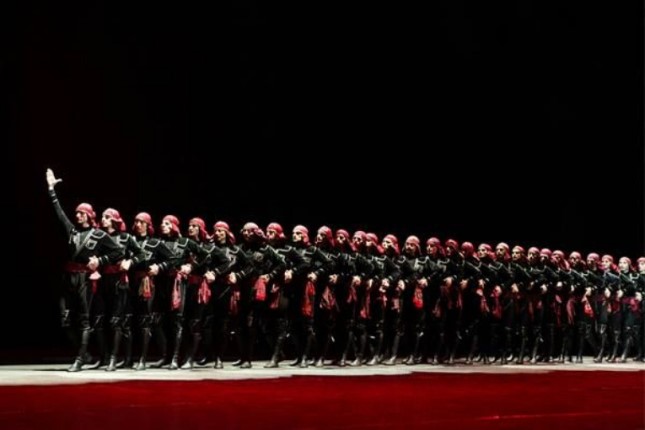
The Georgian National Ballet perform the Khoroumi.
The Khoroumi is derived from the history of the Diaokh, an 8th-century BC tribal union located in northeastern Anatolia, and the Colchis, best known from Greek mythology as the destination of Jason and the Argonauts, and home to Medea and the Golden Fleece. Ancient Diaokh was defeated by the precursors of modern-day Armenia, the Urartians, while Colchis succumbed to successive invasions by the Persians, Armenians, and Romans.
The reality is that history did not provide the ancient Georgians with many opportunities to dance the victorious sword dance that has become the defining moment of the Khoroumi.
It is of interest to note that the version of the Khoroumi made popular by the Georgian National Ballet is an amalgam drawn from variations popular in Adjaria, among the Laz, and in Guria.
Adjaria is a predominantly Muslim region of Georgia that borders Turkey, and is home to Batumi, Georgia’s principal port city on the Black Sea coast. Formerly an Ottoman territory, Adjaria was taken by the Russians after the 1876-1878 war with Turkey, recaptured by the Ottomans in 1918 (and later the Turks in 1921), before eventually incorporated into what became the Georgian Soviet Socialist Republic under the Treaty of Kars, Article 6 of which holds that Turkey is a guarantor of Adjarian autonomy (something modern-day Georgian nationalists should bear in mind.)
The Laz trace their heritage back to the Colchis and consist of Georgian peoples who settled in the Trabzon region of modern Turkey. Afforded a modicum of autonomy under the Byzantines, the Laz eventually were absorbed by a succession of Georgian principalities and kingdoms, during which time they were imprinted with their Georgian cultural identity, before being occupied by the Ottoman Empire in the 17th century. For the next 200 years the Laz resisted Ottoman rule, fighting to hold on to their Georgian heritage, before finally being crushed in the mid-19th century. Today the Laz reside primarily in Turkey, with both their language and cultural identity in danger of becoming extinct.
To the north of Adjaria is the Georgian region of Guria, which has known its fair share of trials and tribulations over the centuries. In the 17th century, Gurian princes were compelled to pay an annual tribute to their Ottoman masters of 56 young girls and boys. And, during the 1876-1878 war between Russia and the Ottomans, Guria served as the frontline, and was laid to waste. Guria was considered to be the most ethnically homogeneous region of all Georgia, leading to a strong sense of national identity which proved to be its undoing.
The Gurian peasantry revolted against Russian nobility in 1902, and again in 1905, before being slaughtered by the Cossacks dispatched by the Tsar to bring them to heel. From 1918 until 1921, Guria once again took a leading role in helping create the short-lived Democratic Republic of Georgia, before being crushed by the Red Army and transformed into the Georgian Soviet Socialist Republic.
The Gurians are neighbored to the north by two other Georgian peoples—the Svans and the Mingrelians. The Svans settled in the mountainous region of northern Georgia, while the Mingrelians occupied the valleys and plains of north of Guria. Like Guria, both Svanetti and Mingrelia are considered hotbeds of Georgian nationalism. It was the Svans who, in the summer of 1989, famously emerged from their mountain redoubt in Zemo Svaneti, shirtless, to march on Sukhumi to stamp out unrest among the Abkhazian minority.
And it is a Mingrelian scholar, Zviad Gamsakhurdia, who is considered by many to be the father of Georgian nationalism and who served as Georgia’s first president following independence from the Soviet Union in 1991. It was under Gamsakhurdia’s leadership that Georgia sought to violently suppress South Ossetian independence to preserve Georgian sovereignty and territorial integrity in the aftermath of the collapse of Soviet authority, setting the scene for Georgia’s short, tragic war with Russia in 2008.
Today the crowds of young Georgians gather in Tbilisi, shouting “Sokhumi! Sokhumi!” “Sokhumi” to entice the Georgian government to recapture Abkhazia through force of arms, thereby fulfilling the larger NATO-driven objective of opening a second front with Russia. Lest they become too nostalgic over perceptions of Georgian nationalistic military might, however, history provides a stark reminder that all is not what it seems to be.
In September 1993, when the fate of Sukhumi hung in the balance, it was Mingrelian militias under the control of Loti Kobalia, a Gamsakhurdia loyalist, who blocked the train carrying Georgian reinforcements to Abkhazia, disarming them, and dooming the Sukhumi garrison—and the civilian population they protected—to defeat.
And in October 1993, after the fall of Sukhumi, tens of thousands of Georgian refugees who were fleeing for their lives had to make the journey through the mountains of Zemo Svaneti, where armed gangs of their erstwhile Svan allies set up roadblocks, robbing the desperate Georgians of whatever possessions they had managed to bring with them, before sending them on a journey over the snow-covered Kodori Gorge, where scores of women, children, and the elderly perished of exposure and starvation.
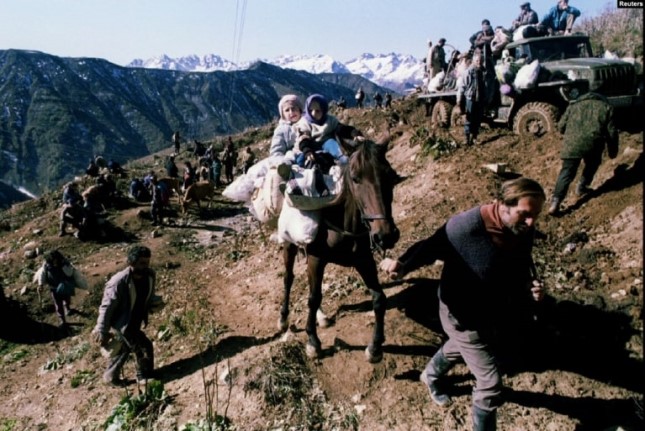
Georgian refugees from Sukhumi make their way over the mountains while fleeing from Abkhaz forces, October 1993.
Sukhumi, the capitol of Abkhazia where my wife was born and raised, is no longer under Georgian control. Yes, it was the Abkhaz militias, backed by Russia, the Chechens, Armenians, and other northern Caucasus peoples who carried out the attacks that led to the slaughter of thousands of Georgian civilians and the ethnic cleansing of more than 200,000 others, including my wife, her brother, and their parents.
Yes, it was the policies of Soviet ideologues such as Mikhail Andreyevich Suslov that helped foster and nurture the separatist imaginations of the Abkhaz and other northern Caucasus peoples as a counter to nascent Georgian nationalism.
But the origins of the Abkhazian conflict of 1992-93 can be traced to the nationalistic excesses of Georgians as well. It was the criminal gangs of Jaba Ioseliani’s paramilitary Mkhedrioni (“Horsemen”), whom Eduard Shevardnadze unleashed on Sukhumi in August 1992, that transformed what had been a political dispute between Georgia and its Abkhaz minority into a Civil War which Georgia eventually lost.
Georgians betraying Georgians is a theme, it seems, one that cost Georgia its Abkhazian territories, including the city of Sukhumi, in 1993, and which today appears hell-bent on setting up Georgia for its lemming-like effort to provoke Russia into a war that Georgia cannot win, and which, if it occurs, it will not survive as a modern, viable nation state.
Yes, you brave sons and daughters of Georgia—chant your slogans, eat your Khinkali and Khachapouri, drink your Kvanchkara, and watch your women dance the Kartuli, before regaling yourself with the masculine drama of the Khoroumi.
But keep in mind that the Khoroumi is the dance of a defeated people whose ambitions of glory were, always and inevitably, crushed by the power of larger neighbors.
Russia is a larger neighbor.
The youth of Georgia would do well to consider the following: few, if any, Americans can appreciate the role of Khinkali and Khachapouri in Georgian life, or the history of Georgian wine-making that is encapsulated in Kvanchkara, the social intricacies of the Kartuli, and the painful history behind the Khoroumi.
To most Americans, it is just food, wine, and some funny dancing.
This is the reality of the society you Georgians are betting your future on—America doesn’t care about you.
Americans don’t even really like you. We barely tolerate your food and wine, and we view your culture as a mere curiosity.
History clearly shows that we are definitely not going to die for you.
You exist only to serve our larger geopolitical goals and objectives.
You are nothing more than part of the “belt of instability” being installed by the United States along Russia’s periphery.
Reflect on that for a moment—Georgia’s American purpose is to generate regional instability. Who pays the price?
Not America.
Georgia.
Georgia is but a smaller version of Ukraine, another cog in the American “belt of instability.”
Reflect on that as you act on the American-driven goal of opening a second front against Russia.
Reflect on the fate of Ukraine.
Reflect on the hundreds of thousands of Ukrainian dead.
Reflect on the tens of millions of displaced and homeless Ukrainian people.
Reflect on the trillion-plus dollars of infrastructure damage to Ukraine.
Reflect on the Ukrainian territory now permanently lost.
Reflect on the fact that Ukraine will, as was the case with Afghanistan before it (and South Vietnam before that), ultimately be abandoned to its fate by its good “friends,” the Americans.
And understand that what Russia has done to Ukraine in a year can be accomplished against Georgia in less than a month.
Georgia will lose Abkhazia and South Ossetia for good--forever. Russia may very well take Poti for good measure, along with Gori and Kutaisi. And why not? If Georgia wants to transform itself into a permanent military threat to Russia, then Russia is obliged to permanently remove that threat.
Once Georgia begins being carved up, Turkey may take Adjaria. This is not idle speculation—Turkish President Recep Erdogan has been making statements about Turkey’s historic claim to Batumi under the terms of Attaturk’s “National Contract,” or Misak-i Milli, of 1920, which set forth the terms of the founding of the post-Ottoman modern Turkish Republic.
Once Georgia begins to be partitioned, there is not a damn thing either the United States, the European Union, or NATO can or will do about it.
Georgia will cease to exist as a viable modern nation state.
Guaranteed.
Why? Once again, I remind the people of Georgia—America doesn’t like you.
We are not your friend.
We are using you.
And when we are done using you, we will abandon you.
I’ll leave every Georgian reading this to reflect on the following:
Russian women can knead the dough used to make Khinkali with the same patient skill as the women of Georgia, because they have Georgian friends and relatives with whom they grew up doing just that as an act of social bonding.
Russian women can appreciate the intricacies associated with making the different styles of Khachapouri, because they have vacationed in Georgia, and know the pleasant culinary vagaries of its different regions.
Russian men can discard the Khinkali tops with abandon, devouring slices of Khachapouri, because eating Georgian food is second nature to them—they have done so all their life. Georgian cuisine is not foreign to them—it is their cuisine, because every Russian city of note has at least one Georgian restaurant. And they can do this while chasing each savory bite with a sip of Kvanchkara, all the while discussing the legacy of Stalin with a level of detail and passion that only comes from being raised in the shadows of a shared legacy.
Georgians and Russians bled together in the Great Patriotic War.
Georgians and Russians suffered together in the Gulag.
Georgians and Russians studied together in the same universities.
Georgians and Russians have married and raised families together.
Russians watched the Kartuli and Khoroumi being performed just like Georgians watched Swan Lake and The Nutcracker Suite, with a mutual appreciation of the cultural and historical importance and relevance of each step, each gesture, each movement, because it was their shared culture.
In 1829, a Russian poet, Alexander Sergeyevich Pushkin, wrote “Upon the Hills of Georgia,” following the rejection of a marriage proposal. He joined the Russian Army, and was sent to serve in Georgia where, in the foothills of the southern Caucasus Mountains, along the banks of the Aragvi River, he penned this classic verse of unfulfilled love.
Dark falls upon the hills of Georgia,
I hear Aragva's roar.
I'm sad and light, my grief - transparent,
My sorrow is suffused with you,
With you, with you alone...My melancholy
Remains untouched and undisturbed,
And once again my heart ignites and loves
Because it can't do otherwise.
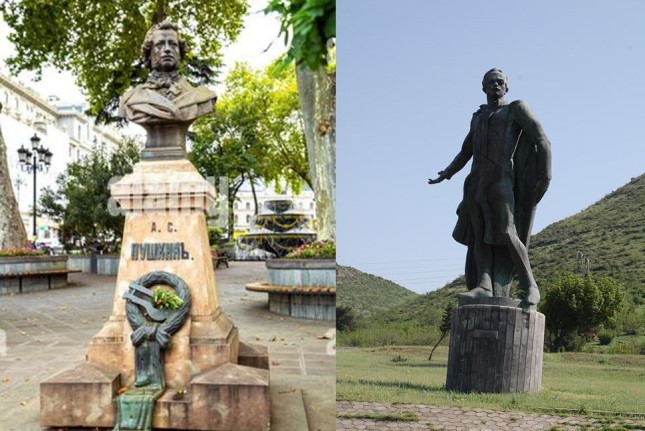
Statues to Alexander Pushkin (left) and Mikhail Lermontov (right) in Tbilisi, Georgia.
Pushkin knew and understood Georgia. He had read Shota Rustaveli, and from such a foundation he was able to write a poem about unrepentant love, set in the beauty of Georgia, as told by a man whom many have come to recognize as representing the very soul of Russia.
Pushkin’s words served as an inspiration for other Russian writers, such as Mikhail Yuryevich Lermontov, another Russian officer who spent time in Georgia, and who became known as “the poet of the Caucasus.”
My point is simply this—Russians know Georgia. Russians understand Georgia. Russians love Georgia.
The fact of the matter is, despite all of the difficulties between Russia and Georgia, Russia is, and forever will be, a better friend to Georgia than America.
“Sokhumi!” “Sokhumi!” “Sokhumi!”
The people of Georgia have allowed themselves to be seduced by the illusion of American friendship into believing that the road to Sukhumi runs through Washington, DC and Brussels, when all along all they had to do was keep the road to Moscow open, and Sukhumi could be theirs again.
I watch in sorrow as the misguided youth of Georgia chant the name of a city they have never known and, because of their misguided actions, will never know. And as I listen to their foolish words, I understand that, unless Georgia changes course, my family and I, together with all of Georgia, must bid the city we know and love farewell, because if Georgia opens a second front against Russia, Sukhumi will be lost to us forever.
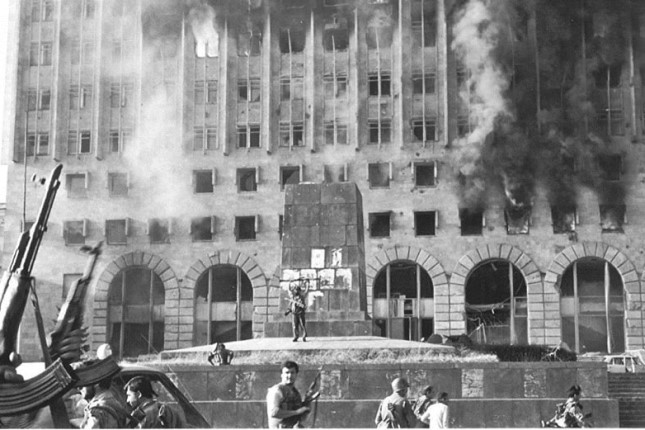
The fall of Sukhumi to Abkhaz rebels and their allies, September 27, 1993.
Main photo: Georgians protest against foreign agent registration legislation, March 2023.
Source: Scott Ritter Extra.
